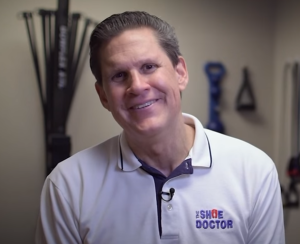Discovering the ideal orthotics for alleviating Achilles tendonitis is crucial for effective treatment. With 7 key tips, patients selecting the best orthotic solution for arched foot problems become more manageable. Understanding your specific needs and considering factors like material, fit, and support level are essential in this process. By exploring these tips, you can make an informed decision that promotes healing and comfort. Stay tuned to uncover valuable insights on choosing orthotics tailored to address Achilles tendonitis effectively.
Understanding Achilles Tendonitis
Insertional VS. Noninsertional
Differentiating between Insertional and Noninsertional Achilles Tendonitis:
Achilles tendonitis can be either insertional, affecting the lower part of the tendon, or noninsertional, impacting the middle portion. Insertional tendonitis occurs where the tendon attaches to the heel bone, while noninsertional affects the middle of the tendon.
Understanding the specific tendon areas affected in each type:
Insertional Achilles tendonitis involves inflammation at the point where the tendon inserts into the heel bone. On the other hand, noninsertional Achilles tendonitis affects the fibers in the middle portion of the tendon.
Identifying the target population for each type of Achilles Tendonitis:
Insertional Achilles tendonitis commonly occurs in individuals who engage in activities that put stress on their heels, such as runners and dancers. Noninsertional Achilles tendonitis is more prevalent in younger, active individuals.
Identifying Aggravating Factors
Factors like excessive running, sudden increase in physical activity, tight calf muscles, and wearing improper footwear can exacerbate Achilles tendonitis. Ignoring these factors may lead to chronic pain and reduced mobility.
Repetitive activities like running long distances without proper rest intervals can strain the Achilles tendon. Wearing shoes with inadequate support or cushioning can increase pressure on the tendon.
Rest plays a vital role in allowing the inflamed Achilles tendon to heal. Adequate rest periods between physical activities help prevent overuse injuries and promote tissue repair.
Can Orthotics Help
Orthotics provide support and cushioning to reduce stress on the Achilles tendon during movement. They help correct foot alignment issues that may contribute to tendon strain, promoting healing and preventing further damage.
Custom orthotics are tailored to an individual’s foot structure and gait pattern, enhancing their effectiveness in reducing pressure on the Achilles tendon. When used alongside physiotherapy exercises, they aid in restoring proper foot function and alleviating pain.
Orthotics offer pain relief by distributing pressure evenly across the foot and reducing strain on the Achilles tendon. They improve biomechanics, enhance stability, and facilitate a quicker recovery from Achilles tendonitis.
The Role Of Orthotics In Treatment
How Orthotics Offer Relief
Orthotics reduce strain on the Achilles tendon by providing support and alignment for the foot. They help to distribute pressure evenly, alleviating stress on the affected area. By wearing orthotic devices, patients can experience less discomfort and better mobility.
Orthotics play a crucial role in improving foot mechanics by correcting issues such as overpronation or supination. This correction helps to prevent further damage to the Achilles tendon and promotes proper gait and movement patterns. As a result, individuals with Achilles tendonitis can engage in activities with a reduced risk of exacerbating their condition.
Silicone Achilles sleeves and heel lifts are popular orthotic options that provide relief for Achilles tendonitis. The sleeves offer cushioning, reducing friction and irritation around the tendon. Heel lifts help to adjust the angle of the foot, promoting better alignment and reducing strain on the Achilles tendon during movement.
Selecting The Right Type
When choosing orthotics for Achilles Tendonitis, it is essential to consult a podiatrist to determine the most suitable option for your condition. Factors such as foot structure, symptoms, and activity level should be considered to ensure optimal effectiveness. Custom-made orthotic devices may be recommended for individuals with specific needs or severe cases of Achilles tendonitis.
The variety of orthotic types available allows for personalized treatment based on individual requirements. From arch supports to cushioned insoles, there are options designed to address various issues associated with Achilles Tendonitis. By selecting the right type of orthotic device, patients can experience improved comfort, stability, and reduced pain while engaging in daily activities.
Avoiding Common Mistakes
To avoid common mistakes when selecting orthotics for Achilles Tendonitis, it is crucial to prioritize proper fit and function. Ill-fitting orthotic devices can worsen symptoms and lead to discomfort or injury. Patients should work closely with their podiatrist to ensure that the orthotics meet their specific needs and provide adequate support during movement.
Choosing orthotics based on individual needs and daily activities is essential for effective treatment of Achilles Tendonitis. Orthotic devices should complement a patient’s lifestyle and activity level while addressing underlying biomechanical issues contributing to the condition. By avoiding common mistakes in selection and usage, individuals can maximize the benefits of orthotics in managing Achilles Tendonitis.

7 Key Tips For Choosing Orthotics
Assessing Foot Arch And Gait
Assess foot arch and gait to determine orthotic requirements. Understanding how foot arch impacts orthotic selection is crucial. By identifying the relationship between gait patterns and orthotic effectiveness, you can make informed decisions.
Exploring various options for orthotic devices, including custom-made ones, allows you to find the best fit for your feet. Consult a podiatrist to assess your specific needs and recommend suitable orthotic devices based on your condition. Consider different types of orthotics tailored to your foot structure, ensuring proper support and alignment.
Material And Cushioning Importance
The material and cushioning in orthotics play a significant role in providing comfort and support. When evaluating orthotic materials, consider both comfort and support aspects. Choose orthotics with appropriate cushioning to effectively relieve Achilles Tendonitis.
Size And Fit Precision
Ensure precision in size and fit when selecting orthotics. Customizing orthotics based on individual foot measurements enhances their effectiveness. Emphasize accurate sizing as it directly impacts the efficacy of the orthotic device.
Custom VS. Over-The-Counter
Comparing custom orthotics with over-the-counter options reveals distinct benefits. Custom orthotics offer personalized support tailored to individual needs. While over-the-counter options are readily available, they may have limitations in addressing Achilles Tendonitis effectively.
Understand The Benefits Of Foot Orthotics In Advance
Understanding the benefits of foot orthotics in advance is a super important tip when choosing the best orthotics for your Achilles tendonitis. Orthotics are special shoe inserts that can help support your feet and improve how you walk or run. By knowing the benefits of orthotics, like reducing pain, providing better arch support, and improving overall foot alignment, you can pick the right ones for your specific needs. Different types of orthotics, such as rigid or soft ones, offer varying levels of support and cushioning. So, understanding these benefits beforehand will help you find the perfect orthotics to ease your Achilles tendonitis.
Consider The Amount Of Support You Require
When choosing the best orthotics to help with Achilles tendonitis, it’s important to think about how much support you need. Orthotics come in different levels of support, like soft, medium, and firm. If your Achilles tendonitis is mild, you might do well with soft support. But if it’s more severe, you might need firm support to help your foot and ankle. The amount of support you require depends on how much pain and discomfort you’re feeling. So, make sure to consider this when picking out your orthotics to get the best relief possible for your Achilles tendonitis!
Obtain Expert Opinion Or A Prescription
Obtaining an expert opinion or a prescription is a great tip when choosing the best orthotics to relieve Achilles tendonitis. Experts, like podiatrists or orthopedic specialists, can assess your specific condition and recommend the most suitable orthotic devices for your needs. They can provide personalized advice based on factors such as the severity of your Achilles tendonitis, your foot structure, and any underlying issues. By seeking professional guidance, you can ensure that you are investing in orthotics that will effectively support your feet and alleviate discomfort. Additionally, experts can help you avoid potential complications or further injury by recommending the right type of orthotics for your situation.
Best Orthotic Features For Achilles Tendonitis
Arch Support Essentials
Orthotics with adequate arch support are crucial for managing Achilles Tendonitis effectively. The arch support helps distribute pressure evenly along the foot, reducing strain on the Achilles tendon. Optimal arch support promotes proper alignment and reduces overpronation, a common issue associated with Achilles Tendonitis. When selecting orthotics, prioritize those with firm arch support to enhance stability and alleviate discomfort.
Heel Lift Benefits
Heel lifts play a significant role in alleviating Achilles Tendonitis by reducing tension on the tendon. They help in maintaining a slight elevation in the heel, which decreases stress on the Achilles tendon during movement. By preventing excessive friction between the heel and shoe, heel lifts can aid in reducing inflammation and discomfort. For individuals with insertional Achilles Tendonitis, orthotics with appropriate heel lifts can provide added cushioning and support.
Flexibility And Stability
When choosing orthotics for Achilles Tendonitis relief, it is essential to strike a balance between flexibility and stability. Optimal flexibility allows for natural foot movement while providing adequate support to prevent overpronation or supination. Orthotics that offer stability without compromising flexibility are ideal for individuals seeking long-term comfort and pain relief. By ensuring a harmonious blend of both aspects, orthotics can effectively address issues related to Achilles Tendonitis.
Expert Recommendations
Seeking Professional Advice
Seek professional advice for orthotic selection to ensure optimal treatment for Achilles Tendonitis. Consult podiatrists to get personalized recommendations tailored to individual needs. Understand the crucial role of expert guidance in managing and alleviating Achilles Tendonitis effectively.
Top Picks For Relief
Explore top picks for orthotics designed specifically to relieve Achilles Tendonitis symptoms. Consider reputable brands that offer specialized orthotic devices known for their effectiveness in providing pain relief. Review the various orthotic options recommended by experts for effective Achilles Tendonitis management.
Maintaining Your Orthotics
Regular Cleaning Tips
Orthotics require regular cleaning to prevent bacteria buildup and maintain hygiene. Cleaning orthotics regularly can extend their lifespan and effectiveness in providing support. Different materials may require specific cleaning techniques, such as gentle wiping for foam orthotics.
It is essential to implement regular cleaning practices for orthotics to prevent odor and bacterial growth. By maintaining cleanliness, you can ensure that your orthotics remain effective and comfortable to wear. Proper hygiene also contributes to the durability of the orthotic material.
Exploring various cleaning techniques suitable for different types of orthotic materials is crucial. For instance, leather orthotics may need conditioning treatments, while foam or gel-based ones may require gentle hand washing. By understanding the specific needs of your orthotics, you can prolong their lifespan effectively.
When To Replace Them
Knowing when to replace your orthotics is crucial for maintaining optimal effectiveness. As experts recommend, it’s essential to be aware of the signs of wear and tear in your orthotics. Common signs include visible cracks, worn-out cushioning, or changes in shape that no longer provide proper support.
Identifying these signs promptly allows you to address them before they impact your foot health negatively. Timely replacement of orthotics is vital for ensuring continued relief from conditions like Achilles tendonitis. By replacing them at the right time, you can avoid discomfort and potential injuries caused by inadequate support.
Understanding the importance of timely replacement goes hand in hand with following expert recommendations on foot care. By staying attentive to the condition of your orthotics and recognizing when they no longer offer adequate support, you can proactively seek replacements. This proactive approach ensures that you consistently benefit from the relief provided by well-maintained and properly functioning orthotics.
Final Remarks
In conclusion, the seven key tips for selecting the best orthotics to relieve Achilles tendonitis provide a comprehensive guide for individuals seeking effective treatment. Understanding the condition, the role of orthotics, and expert recommendations are crucial in making informed decisions when choosing orthotic devices. By considering the specific features tailored for Achilles tendonitis and maintaining these orthotics properly, individuals can enhance their recovery process significantly.
For those struggling with Achilles tendonitis, implementing these tips can lead to improved comfort, mobility, and overall well-being. It is essential to prioritize the health of your feet and seek professional advice when necessary. By following these guidelines diligently, individuals can mitigate the impact of Achilles tendonitis and experience relief from pain and discomfort. Take proactive steps today to select the best orthotics and pave the way for a smoother journey toward recovery.
Frequently Asked Questions
1. How Can Orthotics Help In Relieving Achilles Tendonitis?
Orthotics provide support and cushioning to the foot, reducing strain on the Achilles tendon. They help correct biomechanical issues that may contribute to the condition, promoting proper foot alignment and reducing pain during movement.
2. What Are Some Key Features To Look For In Orthotics For Achilles Tendonitis?
When selecting orthotics for Achilles Tendonitis, look for features like arch support, cushioning in the heel area, shock absorption properties, and a contoured design that supports the natural shape of the foot. These features can help alleviate pressure on the Achilles tendon.
3. Are There Specific Recommendations From Experts When Choosing Orthotics For Achilles Tendonitis?
Experts recommend consulting with a podiatrist or orthopedic specialist to get custom-made orthotics tailored to your specific needs. Custom orthotics offer personalized support and alignment correction, which can be more effective in managing Achilles Tendonitis compared to over-the-counter options.
4. How Should One Maintain Their Orthotics For Long-Lasting Effectiveness?
To ensure the longevity and effectiveness of your orthotics, it’s important to regularly clean them according to the manufacturer’s instructions. Avoid exposing them to extreme heat or direct sunlight, store them properly when not in use, and inspect them periodically for signs of wear and tear that may affect their performance.
5. Can Orthotics Alone Treat Achilles Tendonitis Completely?
While orthotics play a significant role in managing Achilles Tendonitis by providing support and reducing strain on the tendon, they are typically part of a comprehensive treatment plan. Combining orthotic use with stretching exercises, physical therapy, rest, and other recommended treatments is often necessary for complete healing and prevention of recurrence.
Enhance Your Mobility With Custom Orthotics For Achilles Tendonitis Relief!
Living with Achilles tendonitis can be a challenge, impacting your mobility and causing significant discomfort or pain. For those seeking effective relief, custom orthotics designed specifically for managing Achilles tendonitis, along with expert advice, can offer significant improvements. These improvements are not just in alleviating pain but also in enhancing mobility and preventing further tendon damage.
The Shoe Doctor, with over twenty years of expertise, specializes in creating custom orthotics tailored to support individuals with Achilles tendonitis. Our mission is to deliver orthotics that not only relieve pain but also promote foot health and ensure stability throughout your day. Our specialist, Russell, is committed to providing personalized service, ensuring that each orthotic solution is precisely fitted to meet your unique needs.
Using advanced technology, we generate accurate 3D foot mappings, enabling us to craft custom orthotics that integrate flawlessly with your daily footwear. In collaboration with the Spine & Injury Medical Center in San Jose, California, we pursue a comprehensive approach to tackle your Achilles tendonitis challenges.
Take the first step towards improved daily mobility. If you’re located in the South San Francisco Bay Area, The Shoe Doctor is your premier choice for addressing discomfort related to Achilles tendonitis. We are here to assist you from the beginning, starting with a complimentary initial consultation to begin your path to relief and enhanced mobility. Schedule your consultation today!
Disclaimer
The materials available on this website are for informational and entertainment purposes only and not to provide medical advice. You should contact your doctor to obtain advice concerning any particular issue or problem. You should not act or refrain from acting based on any content included in this site without seeking medical or other professional advice. The information presented on this website may not reflect the most current medical developments. No action should be taken in reliance on the information contained on this website and we disclaim all liability for actions taken or not taken based on any or all of the contents of this site to the fullest extent permitted by law.


